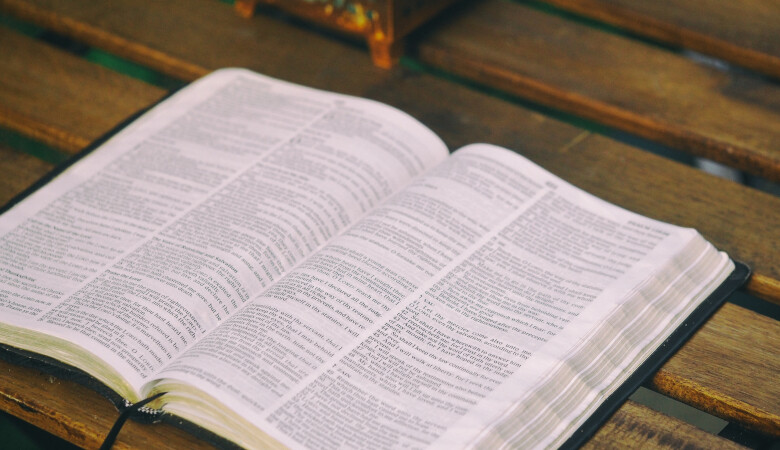Four World Empires (Daniel Sermon 10 of 17)
February 25, 2001 | Andy Davis
Daniel 7:1-28
God's Purpose for the World
I. Martyrs for Christ
Please take your Bibles and open to Daniel chapter 7. We come to one of the truly incredible chapters in the Bible, a chapter which has a clear view of all of human history, and also a clear view of the deity of Jesus Christ in the Old Testament. But there's also a jarring picture as well, in Daniel 7, of the persecution of the saints at the hands of human governments, the suffering children of God.
Recently, I've been learning more about that from the Voice of the Martyrs. There's information in your bulletin, if you want to find out more about them. They need our prayers. And I want to tell you a story about one who lives in Indonesia. Her name is Rika, she's a teenage Christian girl, she lives in Indonesia. She has a beautiful faith in Jesus Christ, but recently, that faith underwent the most severe testing imaginable, leaving her with some terrifying memories and with a greater trust in Jesus her savior. Rika's homeland, Indonesia, you may not know, is the largest or the most populous Muslim land in the world. 13,000 islands, huge number of Muslim people. The Indonesian government requires everyone, all their citizens, to carry ID cards, which indicates, among other things, their religious preference.
Approximately 10% of the country claim to be Christians, identify themselves as Christians. Recently, however, the accounts of persecution at the hands of some Islamic fundamentalist groups reads like a horror story that seems to have no end, including rape and torture, burnings of buildings and of people, even beheadings. This program of religious cleansing by Muslim extremists is well-organized. It's an attack on church buildings and a desire to purify their country, as they believe, from Christianity. Recently, Rika's high school, Christian high school, had a Bible camp, and they had... It was the first one they'd ever tried, and it was going very well. They had an evening worship service, and they were assembled to worship, they were singing praise songs and giving glory to God, and the local government official came and said that they were singing too loudly, and if they didn't sing more quietly, it was possible that they might be attacked. Well, they sang a little more quietly, they weren't trying to offend their neighbors, so they did quiet down a bit, but within an hour, a stone crashed through the window, beginning a night of attack by these Muslim extremists. One of the large rocks hit Rika in the head and knocked her to the ground.
It wasn't long before the Muslims were in the church building itself. The leader begged the Christians, don't panic, just pray, and so the Christians got down on their knees, and they're praying. But the Muslims had come in at this point, and one of them grabbed her by the arms and lifted her to her feet, and was shaking her, and said, "Are you a Christian?" And she said, "All of us are Christians." The man, she said, was tall, with long hair. She was crying as she told this story. I saw this on video tape and the beautiful face and just tears pouring down her face as she told the story. The man picked up a large shard of broken glass off the ground and pressed it to her stomach, and he said, "Repeat after me." And then tried to force her to deny her faith in Christ. She cried out in her heart, in prayer to God, that she would not deny her faith, but rather that she would remain strong. And when Rika did not answer this man, he became enraged, even more angry, like Nebuchadnezzar when Shadrach, Meshach and Abednego wouldn't turn their back on their faith. And so he pressed even harder with this shard, starting to puncture the skin and said, "Do you believe your God can help you now?" Can you imagine that moment? "Do you believe your God can help you now?"
"Yes," Rika answered. "I belong to God and I believe he will save me." Then he grabbed a stick and began to beat her across her shoulders. "You think I am not strong?" he said, "You think I am not stronger than you?" he shouted. She just kept praying to God for strength. Finally, when the man realized he was not going to get her to deny her faith, he stopped and he said, "You are stronger than I am." And he left the building.
Rika, as I said, was crying as she recounted the tale. With tears coming down her face, she said this, "Jesus was willing to die for me, and shed his blood on the cross. He did this for all of us, so it doesn't matter what happens to me, I am willing to suffer for him."
Now, that's a tremendous story, isn't it? And it's a story of deliverance, not unlike what we just read about last week in Daniel chapter 6. We like stories of deliverance, don't we? Daniel 6 is a very popular story. Daniel 7, not so popular. Because in Daniel 6, Daniel escapes the lion's den, doesn't he? He makes it out. God delivers him miraculously. But in Daniel 7, it seems that the saints are given over into the hands of a world ruler, who's going to make war on them and be successful for a period of time. What do you think that means? Well, it means the death of many saints. And how do we understand that? How do we put that together with the vision that we're seeing of God, that we have seen so far in Daniel, of a sovereign and a powerful king, King of Kings and Lord of Lords, the one who just speaks a word and empires rise, and then he speaks and they sink back down into the dust from which they came. How do we orchestrate, how do we organize that thought, of a God who rules so powerfully, and yet his saints are left to suffer at the hands of these governments?
II. Context in Daniel
Now, that is what is being addressed in Daniel chapter 7. In order to understand the context, look at verse 1, it said, "In the first year of Belshazzar, king of Babylon, Daniel had a dream, and visions passed through his mind as he was lying on his bed, he wrote down the substance of his dream." Now, this sets the historical context. We're in the first year of Belshazzar. You remember Belshazzar, of course, he was the one that threw that banquet, that feast that was interrupted by some writing on the wall, you remember? And that was the night that the Medo-Persian empire conquered Babylon and put an end to the Babylonian empire. Well, this is approximately 14 years earlier than that, about 14 years from the fall of Babylon. Political circumstances are of upheaval. Nebuchadnezzar has died. He had died nine years before that. There had been a series of rulers, but none of them could hold the power of the Babylonian empire. None of them had his influence, his authority, and so there were assassinations and they were coups and it was just one leader after another, a time of instability, a time of political upheaval.
And so, Daniel, at that point, one night, went up and lay down on his bed, and whether he was awake or asleep, we don't know, but he had some dreams, and the visions passed through his mind and he wrote them down. Now, this is a fascinating thing. God, just like the writing on the wall, is in the business of writing things down ahead of time and then seeing them come to pass. This is the idea of predictive prophecy. It can't be explained by human explanation. There's no way to understand it, how God can know, so specifically, the future. It is the glory of God to know the end of the matter before it happens, and it is the glory and the encouragement of God's people to read about it in the Bible and to see God's sovereign control and his knowledge of all history. And so he gives Daniel a vision and Daniel writes it down. Reminds me of what Jesus said in John 13:19, similar time, in a way, he was predicting to his disciples persecution and difficulty. And he said this, "I am telling you this now before it happens so that when it does happen, you will believe that I am." That I am what? "Well, that I am God, that I know the end from the beginning. I'm telling you about persecution ahead of time before it happens, so that when it happens, you will know that I am." That's what Jesus said.
And it says in verse 1 that Daniel wrote down, in effect, the sum of the matter. He couldn't get it all down. How do you put a vision on paper? There's nothing wrong with scripture, there's no errors in here, that's not the issue. The issue is, you just can't put a vision perfectly down in writing, but we have enough, we have enough to generate faith. We have enough to see the sovereignty of God, we have enough to believe, but he puts down, it says, in effect, the sum of the matter, and we have these visions.
Now, we're at a key juncture in the Book of Daniel, aren't we? The book really just divides in half. Chapters 1-6 and chapters 7-12. 1-6 are the historical accounts of Daniel in the courts of the Gentiles, he's an important administrator in one Gentile leader after another's court. And so these are court tales, chapter 1, chapter 2, chapter 3, just stories of things that happened as he interacted with important Gentile leaders, emperors and kings. In chapters 7-12, we have what's known as the apocalyptic section of Daniel's book. Apocalyptic means the unveiling, the revealing, the pulling away of the future. Now, we've already had some of that, haven't we, in Nebuchadnezzar's dream. In Nebuchadnezzar's dream, in chapter 2, it was a dream of a great statue in which all of human history was just unfolded. And if you want to do some careful study, just compare Daniel 2 and Daniel 7. There's a great deal of comparison between the two. But this is the apocalyptic section of Daniel.
And there's a book, of course, in the New Testament very much like it, and that's the book of Revelation. And the two are closely related. So we're going to see some visions, visions of the end. Now, what is happening in Daniel chapter 7? If you want a summary of the entire chapter, look down at verses 17-18, and that gives, I think, a perfect summary of what this book or what this particular chapter is about. The four great beasts, which we'll meet in a moment... The four great beasts are four kingdoms that will arise from the Earth, but the saints of the most high will receive the kingdom and will possess it forever, yes, forever and ever. That's a great summary of what's going to go on in Daniel 7.
Chapter Overview
There are four beasts. They rise up out of the sea, they really come up out of the earth, they are human kingdoms. One follows another. The final form of that is given great power to make war on the saints and persecute them, but in the middle of the chapter's is a vision, which Bill read so beautifully for us, of a heavenly court, not an earthly court, but a heavenly court. And the Ancient of Days seated on his throne. The throne is a fire, and there's a river of fire flowing from that throne. And then there's one who's not the Ancient of Days in that vision, but one like a Son of Man coming on the clouds of heaven. He comes into the very presence of the Ancient of Days. Who is the Son of Man? We'll talk about that next week. You can't do it in one week.
But the Son of Man comes, and we know who it is, it's Jesus Christ, the second person of the trinity. And he's given great authority and power, and people from every tribe and language and people and nation will bow down and worship that one on the clouds. And he brings in a kingdom at a key moment in history. When the persecution's at its worst, he comes in and he establishes a kingdom, and he gives it to the saints, and they rule over it, forever and ever, under the authority of the most high God. That's a summary of Daniel 7.
III. Four Beasts from the Sea (vs. 1-8)
Now let's look at the details, 'cause the details are glorious. In verses 2-8, we meet the beasts, four beasts, from the sea. Daniel said, "In my vision at night, I looked, and there before me were the four winds of heaven, churning up the great sea. Four great beasts, each different from the others, came up out of the sea. The first was like a lion, and it had the wings of an eagle. I watched until its wings were torn off, and it was lifted from the ground, so that it stood on two feet like a man, and the heart of a man was given to it. And there before me was a second beast which looked like a bear. It was raised up on one of its sides and it had three ribs in its mouth, between its teeth. It was told, 'Get up and eat your fill of flesh.' After that, I looked, and there before me was another beast, one that looked like a leopard, and on its back, it had four wings, like those of a bird. This beast had four heads and it was given authority to rule. After that, in my vision at night, I looked and there before me was a fourth beast, terrifying and frightening and very powerful. It had large iron teeth, it crushed and devoured its victims and trampled underfoot whatever was left. It was different from all the former beasts and it had 10 horns. While I was thinking about the horns, there before me was another horn, a little one, which came up among them, and three of the first horns were uprooted before it. This horn had eyes like the eyes of a man and a mouth that spoke boastfully."
The Sea: Symbolic for Turbulent Nations
So the setting is a sea. Daniel sees a vision of the sea, and he sees the winds playing on the surface of the sea, moving the surface of the ocean or the sea back and forth, and suddenly, up out of the sea, come these four beasts in succession. Now, what is the sea? The sea is symbolic for the turbulent nations of the world, symbolic for the nations of the world. Isaiah said it very plainly in Isaiah 17:12-13. Listen to these verses. "Oh, the raging of many nations, they rage like the raging sea. Oh, the uproar of the peoples, they roar like the roaring of great waters. Although the peoples roar like the roar of surging waters, when he rebukes them, they flee far away, driven before the wind like chaff on the hills." Isaiah 17:12-13.
So the ocean is just all the peoples and nations and languages, swirling around with all of their conflicts and all of their difficulties, and up out of that turbulence come these four beasts. The four winds are symbolic, perhaps, of God's sovereign judgement and his initiatives, and all storms and turbulences on the sea are caused by the winds from the four directions. And I love what it says in Revelation 21:1. It says, "Then I saw a new heaven and a new Earth, for the first heaven and the first Earth had passed away, and there was no longer any sea." The sea is gone. The turbulent nations are stilled. There's nothing but the people of God. There's nothing but the kingdom of heaven at the end. Oh, how we long for that day. But now all you need to do is just get a newspaper or watch CNN, you can see the raging of many nations, the turbulence.
What Are the "Beasts"?
And up out of them come these beasts. Now, what are these beasts? Well, in verse 15 and 16, Daniel is confused, he's troubled in spirit, and so he asks for information. We've already read, in verse 17, the four great beasts are four kingdoms that will rise up out of the earth. Well, why are the kingdoms called beasts? Why the vision of beasts for human kingdoms? Well, I think it's that human empires of this sort, these kind of huge empires that conquer, usually represent humanity at its worst, humanity at its worst, most bestial, and dominant, raw power, savage fury, total dominance over lesser adversaries, most unlike God, in whose image we were created.
And also, I think we have a contrast between the kingdom of Christ and human kingdoms. Human kingdoms advance by conquest, like a beast, they consume. Christ kingdom advance by self-sacrifice, like a lamb, he is slaughtered. And so it is also for us, and I think it explains also the persecution that Rika and others experience in this world. The kingdom of God is different than the kingdoms of humanity. They advance by ripping and tearing flesh, but our kingdom advances by self-sacrifice. We take up our cross, we follow Jesus, we lay down our lives, we're willing to witness for him.
The First Beast: Babylon (vs. 4)
Now, the first beast, verse 4, can be none other than Babylon. The description is of a lion with eagle's wings, a lion as majestic and regal, the king of the beasts. Nebuchadnezzar had a preoccupation with lions. Excavation of Babylon has shown that there were lions decorating all the walls, everywhere they look, there were lions. The Ishtar Gate, for example, had blue ceramic tile with golden lions, and interestingly, the lions had wings, they found a lion with wings, and it was the main entrance to the city, to the royal area of the city. So Daniel must have walked by it all the time. Daniel must have known right away what that lion with the wing was, it was Babylon.
The wings represent mobility, sovereign power. Just as a lion is the king of the beasts, so eagles are kings of the birds. And so there's a sense of regality here, being a king. But then judgment from God comes on this beast, the wings are torn off, the beast is lifted up from the Earth, interesting. And there's a human stance given to the beast and a human heart. I really think this refers to what happened to Nebuchadnezzar in chapter 4. You remember what happened? His mind was turned into that of a beast, until he repented and acknowledged that the most high is sovereign over the kingdoms of men.
Do you remember what Daniel said to Nebuchadnezzar before that happened? He said, "King, be pleased to accept my advice. Renounce your sins by doing what is right, and your wickedness by being kind to the oppressed…." Stop oppressing people. Stop ripping them to shreds. Show justice for the oppressed, and mercy. Could it be... We don't have a record of it, but could it be, after his repentance, that he was a different man? Could it be he had the heart of a man, and some compassion? There's no record in archaeology, one way or the other, but I'm just trying to understand what happened to this beast, the heart of a man was given to it. Could it be that we'll find Nebuchadnezzar in heaven, and we can ask him about it? I hope so.
The Second Beast: Medo-Persia (vs. 5)
The second beast, verse 5, is Medo-Persia. The description is of a bear eating ribs. A bear is not so regal or elegant, perhaps, as a lion with eagle's wings, ponderous and slow, powerful and strong. Nothing can stop it, but there's no sense of lightning quick movements. It's up on one side, there's a split kingdom here, perhaps, you've got the Medes and the Persians, and, at one point, the Persians gained dominance over the Medes. And so, most of the great leaders of the Medo-Persian empire were Persian, like Cyrus the Great.
Now, this beast is eating three ribs, the commentators are divided, it could refer to three tracks of land that were conquered by the Medo-Persian empire, Lydia, Babylon and Egypt. But the empire's self-serving brutality is evident here, and so also a command given, "Get up and eat your fill of flesh." This is what I'm talking about, human kingdoms ripping and tearing, gluttonous, never satisfied.
The Third Beast: Greece (vs. 6)
Now, the third beast, Greece, verse 6, a description is of a leopard with four wings. The leopard is sleek and agile, deadly, a sense of lightning quick movements, even more than happened with Babylon. And not one set of wings but four wings altogether. A sense of lightning quick conquest. We're gonna talk more about that in Daniel 8, when we meet Alexander the Great, perhaps the greatest military conqueror of all time, who conquered the entire region in four years. Lightning quick conquest. Speed was of the essence, because Alexander did not have long to live. So Greece. The fourth, and also with four heads, could it be it's referring to the fact that his kingdom would be broken into four sections, as we'll learn in Daniel chapter 8.
The Fourth Beast: Rome (vs. 7-8)
And then, finally, the fourth beast, it's not described. There's no title, it's not called a gorilla or some other kind of animal. As a matter of fact, it's so terrifying that there's no animal on Earth that could be used to describe it. That's why Daniel said that he wrote down the substance of the matter. He said, "I couldn't get it down on paper. It was a terrifying beast." Two words are used to underscore just how terrifying it was, and how much fear Daniel felt. It had iron teeth. This harkens back to the vision in chapter 2 of the fourth kingdom, which is Rome, that iron kingdom which crushed everything under its feet. Strong and powerful, it was. Unable to be bent, unyielding and dominant. Iron teeth, it had.
Able to destroy. And there are these 10 horns. Now, I'll tell you something, we're getting into the heart of eschatology, end time teaching. And it's really hard to understand all the symbolism, isn't it? Do you know anyone that's got the end times all figured out? I don't. And people say, "Pastor, I can't wait till you preach through Revelation, so that we can know what it means, and I'll say, "I don't know what it means either." We just preach through and we try to understand it. End time visions are very difficult. But what are these 10 horns? Some commentators believe it was just 10 emperors in the Roman Empire, one after the other.
The problem is that, in the final form of the vision, one of the horns, the little horn, uproots three of the 10 horns, so they kind of are living all at the same time. And that's the image, also, in Revelation 17, of the antichrist, which overthrows three rulers, and the other rulers give their power to him, so that he can rule over the whole world. So, this is a complex vision, and some commentators have tried to put it together, because we have a vision of the second coming of Jesus Christ in this chapter, don't we? And Jesus returns to set up his kingdom, and he returns during the time of the fourth beast. The fourth beast has to be Rome, and so, some commentators put the two together and say there's going to be a revived form of the Roman Empire, in some sense. Don't fully understand that, but there's a continuity, and also a discontinuity.
IV. The Heavenly Throne: Ultimate Victory for the Kingdom of God (vs. 9-14)
Now, in the middle, verses 9-14, we have the verses that were already read for you by Bill, but they're so good, and I'm going to read them again. Verse 9:
"As I look, thrones were set in place, and the Ancient of Days took his seat. His clothing was as white as snow. The hair on his head was white like wool. His throne was flaming with fire, and his wheels were all ablaze. A river of fire was flowing, coming out from before him. Thousands upon thousands attended him, ten thousand times ten thousand stood before him. The court was seated, and the books were opened. Then I continued to watch because of the boastful words the horn was speaking. I kept looking until the beast was slain and its body destroyed and thrown into the blazing fire. The other beasts had been stripped of their authority, but were allowed to live for a period of time. In my vision at night, I looked, and there before me was one like a Son of Man, coming with the clouds of heaven. He approached the Ancient of Days, and was led into his presence. He was given authority, glory and sovereign power. All peoples, nations, and men of every language worshipped him. His dominion is an everlasting dominion that will not pass away, and his kingdom is one that will never be destroyed."
Oh, there's so much in here. The vision of Jesus Christ, the Son of Man, one like a Son of Man riding on the clouds of heaven. But what is the purpose of this little section in the middle of the chapter? The point is that we've got this little horn speaking blasphemy, making war against the saints, and a heavenly court is seated. It is God's court, it is the Ancient of Days, and he will not tolerate this forever. He will not allow the war on the saints to go on forever.
But he's going to intervene, he's an interfering God, or else his sovereignty would mean nothing. And he does interfere with the events on Earth. We've seen that already, with King Nebuchadnezzar, he gets involved. And so he renders a decision. And so the final form of the empire is destroyed, Jesus Christ returns, and his kingdom is set up. We'll talk about that more next week.
V. The Fourth Beast and the "Little Horn" (vs. 15-28)
Now, in verses 15-28, we have a zeroing in, a focus on this fourth beast and the little horn. Daniel has an anguish request. He doesn't get it, he doesn't understand. In verse 15 and 16, he says, "I, Daniel, was troubled in spirit, and the visions that passed through my mind disturbed me. I approached one of those standing there and asked him the true meaning of all this. So he told me, and gave me the interpretation of these things. The four great beasts are four kingdoms that will rise from the Earth, but the saints of the most high will receive the kingdom and will possess it forever, yes, forever and ever."
23:28 S1: So Daniel doesn't understand, he doesn't get it. And he does the right thing, he asks for wisdom. James 1:5 says, "If any of you lacks wisdom, let him ask God, who gives generously to all without finding fault, and it will be given to him." And Jesus said, "I no longer call you servants because a servant does not know his master's business. Instead, I have called you friends, because everything I've heard from the Father, I've made known to you." Isn’t that beautiful? Jesus isn't holding back any secrets. Anything you need to know, he will tell you, so you come and you ask. If you lack wisdom in your life, come and ask. If you want to understand the Bible, better, come and ask. If you want to be fruitful, come and ask, and he will give wisdom.
Our God is a giving God, and he says, in Amos 3:7, "Surely the sovereign Lord does nothing without revealing it to his servants, the prophets." Isn’t that beautiful? Amos 3:7. And so, he gives information. We have the terror of the fourth beast, verse 19, Rome caused terror all over the world. And he said, in verse 19, "I wanted to know the true meaning of the fourth beast, which was different from all the others, and most terrifying. With its iron teeth and bronze claws…the beast that crushed and devoured its victims and trampled underfoot whatever was left. I also wanted to know about the 10 horns on its head, and about the other horn that came up, before which three of them fell, the horn that looked more imposing than the others, that had eyes, and a mouth that spoke boastfully. As I watched, this horn was waging war against the saints and defeating them, until the Ancient of Days came and pronounced judgment in favor of the saints of the most high. And the time came when they possessed the kingdom.
Verse 23, "He gave me this explanation. The fourth beast is a fourth kingdom that will appear on Earth. It will be different from all the other kingdoms, and will devour the whole earth, trampling it down and crushing it. The 10 horns are 10 kings who will come from this kingdom. After them, another king will arise, different from the earlier ones. He will subdue three kings. He will speak against the Most High and oppress his saints, and try to change the set times and the laws. The saints will be handed over to him for a time, times, and half a time. But the court will sit, and his power will be taken away and completely destroyed forever. Then the sovereignty, the power, the greatness of the kingdoms under the whole heaven will be handed over to the saints, the people of the most high. His kingdom will be an everlasting kingdom, and all rulers will worship and obey him. This is the end of the matter. I, Daniel, was deeply troubled and my face turned pale, but I kept the matter to myself."
He wanted to know more about this fourth beast, which we know to be Rome. Verse 19. Not merely content to conquer, Rome had to crush its adversaries underfoot. In the Second Punic War, when they defeated Carthage, they weren't satisfied with just destroying the city, but instead, they went systematically through all the fields around the city, and sowed them with salt, so that nothing would ever grow there again, and nothing has.
This is Rome. It crushes under feet, and it devours its victims, and it tramples what was left underfoot. And then we have these 10 horns. The horn is a symbol of strength and power, usually represents a king, the 10 horns or 10 kings from the fourth beast, the angel actually gives us very little information of them. If you want to know more, you have to read in Revelation 17. I believe that these are four leaders or 10 leaders that exist in the fourth beast, the final form of what we could call the Roman Empire, right before the time of Christ, right before the days of the antichrist, the final antichrist. Others disagree, but I think this is the best interpretation, because they fight against the antichrist all at once, and three of them are conquered, so they must be existing all at the same time.
The Rise of the Little Horn (vs. 20-21, 24-25)
Now, in verses 20 and 21, and also 24 and 25, we have the rise of the little horn. The horns' descriptions are that it is little, but then, later, it says it's imposing, more imposing than all the others. How could it be little and then imposing? Well, I think it speaks of a kind of a growth. It grows up. It starts little and then gets greater, more powerful, more imposing. It has the eyes of a man. There's a knowledge to it, a sense of wisdom, a kind of an earthly wisdom, and it speaks boastfully. This is a big theme with the antichrist, speaks boastfully against God, especially against God, "He will speak against the Most High." And what does the horn do? Well, it rises up out of nowhere, and it uproots and subdues the three kings, but, most specifically, it wages war on the saints. Look at verse 21 and verse 25, "As I watched, this horn was waging war against the saints, and defeating them." Verse 25, "The saints will be handed over to him for a time, times, and half a time." This is not the triumph of the lions' den. This is the suffering of the saints. And the scripture is clear, in terms of the church of Jesus Christ, first the suffering, and then the glory.
First the suffering, and then the glory. First, we have persecution, and even martyrdom, and then we have the glory of a worldwide kingdom. Now, this antichrist is permitted by God, for a short time, to persecute the saints. It says, for a time, times, and half a time. As we look across the scripture, we find numerous times referred to a three and a half year period, 1330 days, 42 months, a time, times, and half a time. For three and a half years, this has been called the Great Tribulation, and the saints are crushed and destroyed during this period of time. And it says he changes the set times and the seasons. There's a rejection of that cycle that was set up by God, six days of creation, and on the seventh, a Sabbath rest. And you are here now, the Sabbath moved over to the first day, because we celebrate the resurrection of Jesus Christ, the new creation. But there's a seven-day cycle, isn't there? He overturns that, set times overturned, because he has power.
VI. The Present and Future Antichrist
Now, we have, therefore, described the issue of the antichrist. Now, where does this term antichrist come? I believe the scripture teaches that there is a present antichrist or antichrists, and there will be yet a future antichrist. There are antichrists alive today. Some will say to me, "Do you believe the antichrist is alive today?" And I'll say, "Who knows? Maybe you're the antichrist?" Oh, I hope not. Is the antichrist alive today? I really have no way of knowing. But is the final antichrist alive? That we don't know, but we know there are antichrist today, now. How do we know that? Because we're in the final hour. 1 John 2:18, it says, "Dear children, this is the last hour. And as you have heard that the antichrist is coming, that's the future antichrist, even now many antichrists have come."
Now, what is an antichrist? Well, he gives us a definition, 1 John 2:22. "Who is the liar? It is the man who denies that Jesus is the Christ, such a man is the antichrist, he denies the Father and the Son." So John gives us, really, an effective theological definition of antichrist. 2 John 7, it says, "Many deceivers who do not acknowledge Jesus Christ is coming in the flesh have gone out into the world. Any such person is the deceiver and the antichrist." So the antichrist is anyone who denies, in a powerful way, perhaps, as a teacher, as a leader, that Jesus Christ has come in the flesh. They deny the incarnation. They deny the deity of Christ. This is the spirit of antichrist.
As I've said before, Satan has three great attacks on the church, you should know by now what they are, persecution, worldliness, and false doctrine. Those are the three, persecution, worldliness, or corruption by the world, and false teaching. This is the work of the antichrist, and it's going on right now, even as we speak. But there is yet a future antichrist called The Man of Sin. If you want to know more about him, read 2 Thessalonians chapter 2.
In 2 Thessalonians 2, it describes the Man of Sin. The word antichrist isn't used there, but this is what it says, "Do not let anyone deceive you in any way, for the final day will not come until the rebellion occurs, and the man of lawlessness is revealed, the man doomed to destruction. He will oppose and will exalt himself over everything that is called God or is worshipped, so that he sets himself up in God's temple, proclaiming himself to be God. 2 Thessalonians 2:8-9, it says, "The lawless one will be revealed, whom the Lord Jesus will overthrow with the breath of his mouth and destroy by the splendor of his coming. The coming of the lawless one will be in accordance with the work of Satan, displayed... " Listen to this, "In all kinds of counterfeit miracles, signs, and wonders." So the antichrist, the future antichrist will come with great power that no one can explain, a supernatural miracle-worker he will be. And he will sit in God's temple, and he will proclaim himself to be God. And for, I believe, three and a half years, he will attack the saints, and the saints will be given into his hand, until Jesus Christ comes and overthrows him with the breath of his mouth.
VII. Applications
Now, application. What does this have to do with my life? Is this going to help me be a better employee tomorrow? I'm having trouble with my joints and physical problems. Recently, I've had some illness, or I know somebody that's got an illness. What is this going to do about them? I've had car trouble recently. Is this going to help me solve my problem with my car? I've had financial trouble. Tax day is coming up. I don't know how I'm going to pay my taxes. What does Daniel 7 have to do with all those things? Well, nothing, in one sense, nothing, everything, in another sense.
First, I want to say could it be that what God is doing in the world is bigger than any of those problems you listed? Could it be that what God is doing in the world is bigger than even our own lives itself? Even bigger than Rika's life? Could it be that God is working a plan so majestic and so glorious and we only see one part of it? And so, Daniel 7 lays out a majestic tapestry of all of human history and the second coming of Christ, and that there is no connection to your car trouble, immediately, but there is a connection to how you fit into world history if you're part of the kingdom of Jesus Christ. He's giving you a kingdom that will never end.
Well, what does that mean that will never end? Well, we've seen kingdoms that have ended one after another. They rise and they fall, but we know that there's a kingdom coming that will never end. So, in one sense, this chapter has nothing to do with all those problems I've listed, but, in another sense, it has everything to do with them. And how is that? Well, I think the verse that I printed in the application section here explains plainly how this verse connects to your life. John 16:33, Jesus said this, "I have told you these things so that, in me, you may have peace. In this world, you will have trouble, but take heart. I have overcome the world." This is a perfect summary of Daniel 7, "I have told you these things," he says. He's given it to us. You know what's going to happen. It shouldn't be shocking to you when persecution occurs. I have told you these things ahead of time, in many different places and ways. I have told you these things. Well, Jesus, why did you tell us these things?
So, that, in me, you will have peace, not in your earthly circumstances, not in whether your car is running well, or your body feels good, not in whether your finances are all dealt with properly, no, in me, you will have peace. In this world, you will have trouble. If you live in Indonesia, it may mean the end of your life. Stop just a moment. Why is that? Why do Christians die? Why doesn't God interpose himself? Why doesn't he stop every time that a shard of glass is pushed to the stomach of a teenager and make sure that she doesn't die? Why not? That was a good ending, wasn't it? But others haven't been good. Why do they die?
Well, God answered that as well. 2 Peter 3, "The Lord is not slow in keeping his promise, as some understand slowness. He is patient with you, not wanting anyone to perish, but everyone to come to repentance. But the day of the Lord will come like a thief…" In verse 15 of 2 Peter 3, "Bear in mind that our Lord's patience means salvation." He's waiting and waiting until the full number comes in, he's waiting and waiting until all who will come to repentance have the opportunity to do so. Every passing generation people get born. Aren't you glad he waited until the year you were born? And he's waiting. And meanwhile, there's suffering. And, by the blood of martyrs, the seed of the church springs into eternal life for many. Daniel chapter 7 unfolds a plan of history which cannot be derailed. God is sovereign over it, and it means salvation for people like you and me. It may be that you have never come to personal faith in Christ.
Can I urge you to not put off a decision or a commitment to Jesus Christ? In a moment, I'm going to stand down here in front. If you have never given your life to Christ, don't wait. Come to faith in Jesus Christ. He is the Ancient of Days. He is the Son of Man who will come and rule in your life. His death is sufficient for all your sins. Please come. I'm going to close in prayer now, and we'll have our closing hymn.

















